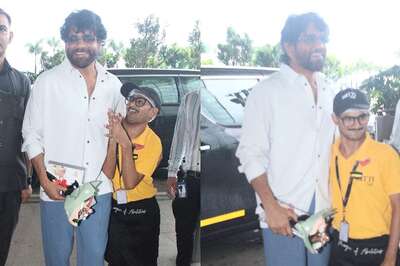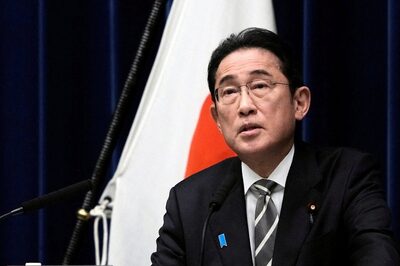
views
The summit was inaugurated by Union Minister for Electronics & IT, Ashwini Vaishnaw, who emphasised the government’s commitment to AI innovation. He spoke about plans to procure over 10,000 GPUs under a public-private partnership to enhance industry efficiencies. Additionally, the minister stated that the Centre will roll out the Rs 10,000 crore India AI Mission in the next few months.
He further highlighted the establishment of an AI innovation centre, the development of high-quality datasets, application initiatives for socio-economic issues, and a significant focus on skill development. Vaishnaw also addressed the challenges posed by AI, particularly the spread of misinformation and disinformation witnessed during the recent Lok Sabha elections.
Amitabh Kant, former CEO of NITI Aayog and G20 Sherpa, highlighted the government’s substantial five-year budget of over Rs 10,000 crore for the India AI mission, with Rs 2,000 crore specifically allocated for deep technology start-ups. He noted India’s significant growth in AI skill penetration and private investments, underscoring the nation’s vibrant engagement in AI development on an international scale. He emphasised the importance of cross-disciplinary AI development and integration across sectors such as healthcare, logistics, agriculture, and FMCG to ensure effective and efficient applications.
Kant drew parallels between the AI revolution and past industrial revolutions, emphasizing AI’s potential to ignite unprecedented innovation and growth. He highlighted several key achievements such as India holds the second highest number of GitHub AI projects globally, accounting for 19 per cent of worldwide AI projects.
From 2015 to 2023, India led the world in AI skill penetration, leading the world in the expansion of its AI talent pool with a 263 per cent increase since 2016. In 2023 alone, AI talent hiring in India increased by 16.8 per cent year over year. India ranked 7th globally in private investments in AI, with nearly $10 billion invested over the past decade and 70 per cent of Indian start-ups are prioritising AI to drive growth, showcasing AI’s critical role in the start-up ecosystem.
Meanwhile, Srinivas Narayanan, VP of Applied at OpenAI, provided an extensive overview of AI’s current and future role in India. He highlighted that AI has significantly accelerated the entrepreneurial ecosystem, enabling the creation of innovative products and tools. Narayanan emphasised that AI is reducing the cost of Intelligence, allowing developers to write code more efficiently and create natural, conversational interfaces, thereby boosting productivity and problem-solving capabilities.
Narayanan praised India’s proactive stance in leveraging AI for various applications, sharing several concrete examples in agriculture, healthcare and education. He also discussed OpenAI’s ongoing commitment to the IndiaAI Mission’s Application Development Initiative. This partnership aims to enable Indian developers to build on OpenAI’s models and deliver large-scale social benefits. He highlighted OpenAI’s previous engagements with India, including visits by CEO Sam Altman and VP of Global Affairs Anna Makanju, emphasising the importance of learning from and collaborating with India.
He concluded by discussing AI’s broader implications, noting that the rapid progress in building generally intelligent models, like ChatGPT, has created new, transformative interfaces for computing. These interfaces facilitate various applications, from daily productivity tools to advanced problem-solving systems, driving substantial societal benefits.
Meanwhile, Joyce Poan, Chief of Education at UNESCO, underscored the need for ethical oversight and responsible AI governance to mitigate risks such as disinformation, discrimination, and privacy breaches. She advocated for transparent and inclusive AI governance that prioritises accountability and emphasised the importance of integrating ethics into AI development and deployment.
Abhishek Singh, Additional Secretary at the IT Ministry, delivered a comprehensive and forward-looking speech, underscoring the critical role of voice-enabled AI applications in bridging the digital divide and empowering India’s unconnected population. He emphasised that AI technology has the potential to revolutionise access to information and services for millions of people, especially in rural and underserved areas.
During this summit, the sixth meeting of the GPAI Ministerial Council was held at Bharat Mandapam. The meeting was chaired by Minister of State for Electronics and IT, Jitin Prasada, with key contributions from Japanese Vice-Minister for Policy Coordination (Internal Affairs), Hiroshi Yoshida and Minister Jelena Begovic of Serbia. Representatives from OECD and UNESCO also participated.
The council discussed the transformative potential of AI, emphasising the need for coordinated international efforts to harness its benefits while addressing emerging risks such as safety, security, misinformation, and biases. The key points included in the future vision are the transformative potential of AI, emerging AI risks, commitment to trustworthy AI, commitment to OECD/UNESCO AI recommendations, unique multi-stakeholder initiative, New Delhi 2023 Declaration, small working group contributions, acknowledging OECD support, renewed GPAI-OECD vision, open membership call, inclusive dialogue with organisations, consensus on new members, equal participation, inclusive governance, strengthening multi-stakeholder nature, development of specific working methods, bridging digital divides, continued constructive dialogue and Serbia as 2024-25 Lead Chair.




















Comments
0 comment